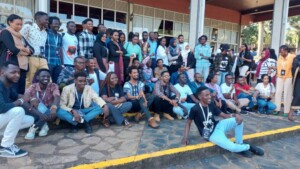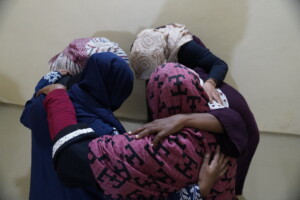‘Young Sudanese not active in political parties’
Young Sudanese, who make up more than 60 per cent of the total population of Sudan, are not active in ‘traditional’ Sudanese political parties, according to Dr Azza Mustafa in an interview with Radio Dabanga’s Youth Issues programme broadcast yesterday.
 Students in the University of El Geneina in West Darfur (File photo: Unamid)
Students in the University of El Geneina in West Darfur (File photo: Unamid)
Young Sudanese, who make up more than 60 per cent of the total population of Sudan, are not active in ‘traditional’ Sudanese political parties, according to Dr Azza Mustafa in an interview with Radio Dabanga’s Youth Issues programme broadcast yesterday.
Dr Mustafa, a former professor of political science at El Zaeem El Azhari University in Khartoum, and a specialist on democracy and political parties, attributes this lack of participation to common misconceptions about the management abilities of youth.
She said that it is too early to judge young people as unfit for a role within political parties as “they have not yet had the opportunity they deserve to truly participate in decision-making”.
According to Mustafa, young Sudanese do not find “the old political programmes” attractive. “Any political party that does not accommodate the youth will alienate them.” This is already happening, she said. “Most of the active young people join civil society organisations. Almost no young people join political parties that still do what they did 50 years ago.”
Mustafa called on “all political parties to reformulate their programmes, so that they will address the issues of all segments of society, especially youth and women. “Otherwise they will lose the support of young people, who will be important in the election process.”

“The current government, facing a critical situation as a result of the legacy of policies of the ousted Al Bashir regime, can at least address the basics of the political, economic and social problems of the youth.”
Youths themselves criticised the weak representation of youth in the transitional government.
Faki Mohamed, a leading member of the Kassala Resistance Committees, told Radio Dabanga that the youth had a leading role in overthrowing the former regime, and should therefore be better represented in policy-making.
This view was also expressed by Asaad El Taher, a youth leader in South Darfur. “All the revolutions that took place in the recent history of Sudan were carried out by young people. They were excluded from power-sharing each time, including after the December Revolution.”
(Pictures updated)
Radio Dabanga’s editorial independence means that we can continue to provide factual updates about political developments to Sudanese and international actors, educate people about how to avoid outbreaks of infectious diseases, and provide a window to the world for those in all corners of Sudan. Support Radio Dabanga for as little as €2.50, the equivalent of a cup of coffee.












 and then
and then